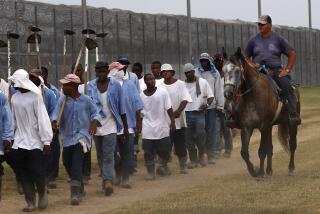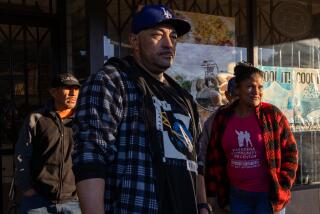China’s president orders probe of brickyard slavery
- Share via
BEIJING — He was a culinary student looking for his first job, and when a stranger offered him restaurant work he eagerly accepted. But the 20-year-old was taken instead to a rural brick kiln where he toiled as a slave with little food, no pay and regular beatings that nearly killed him.
Yet Zhang Yinlei is among the lucky.
He was one of at least 548 workers rescued so far in a crackdown on brick factories in north-central China, where abducted men and children as young as 8 had been sold into slavery for $65 a head. Most of them were freed this week in raids at thousands of kilns in two provinces.
The case has so scandalized China that state media announced Friday that President Hu Jintao had personally ordered a prompt investigation.
Child labor and harsh working conditions used to be the stuff of propaganda movies used by the Chinese Communists to discredit capitalist societies. Today they are a fact of life in a country driven by its own pursuit of wealth, often at the expense of the poor.
China’s leaders, worried about the country’s reputation as the sweatshop of the world, are trying to clean up its image, especially as the 2008 Beijing Olympics approaches.
Embarrassing reports, however, continue to dog them.
China was accused this week of employing children as young as 12 to produce Olympics-related souvenirs. Authorities denied the report by Brussels-based PlayFair 2008. State-run New China News Agency said students from six middle schools and two primary schools had been hired during a holiday period to “pack notebooks, not Olympics-licensed products.”
The latest scandal -- the slavery at the brick factories -- might not have come to light had a group of 400 men with missing sons not sent out a collective cry for help on the Internet. They accused local authorities of turning a blind eye to the abuses and suggested that as many as 1,000 children had been kidnapped from Henan province and shipped to nearby Shanxi province by human traffickers who abducted their children near train and bus stations or lured them away with promises of high-paying jobs.
As a result, more than 35,000 police from Henan province and 14,000 from Shanxi province fanned out to about 10,000 kilns, detaining at least 140 suspects, the news agency said Friday. More raids and arrests were expected.
Before the crackdown, some of the fathers had been conducting their own rescue missions.
“We saved more than 100 boys on 15 different occasions,” said Chai Wei, whose 17-year-old son disappeared in April from a street near their home. Chai and two other men with missing children banded together and traveled to hundreds of small brickyards in search of their children.
Some fathers went undercover. They couldn’t believe what they saw.
“They start work at 5 in the morning and sometimes don’t finish until past midnight,” Chai said. “They get no pay and are fed only bread and water. If they try to run away, they would break their legs. Some were buried alive. We saw police pull out two bodies. One was an 18-year-old. The other was 19.”
The fathers said that most of the time when they showed up, the young workers had been sent into hiding. If not, they said, there was usually a confrontation, and sometimes thugs hired by the owners would beat the parents and chase them away.
“They had completely lost their freedom,” said Zhang Shanlin, the father of the rescued 20-year-old. “I saw six vicious guard dogs and seven hit men. Anyone who didn’t work hard enough was beaten. There was no chance of running away.” His son had refused to work and was burned all over his back with hot bricks.
“Another young man tried to run away -- they burned him on the face, leaving only the mouth,” Chai said. “So he could still eat and continue to work.”
The injured were given no medical treatment and were left in cramped and dirty living quarters where men had not washed for so long that sores caked their bodies. Their hair had grown down to their waists, Chai said.
Zhang said his son was finally sent to a hospital after residents’ reports of the brutal working conditions to police prompted a raid. When they were freed, some of the laborers seemed so dazed and frightened that they could barely talk.
“My son told me that if he hadn’t been rescued he would not be alive today,” Zhang said.
One of the reasons the inhumane treatment has gone on for so long, parents say, is connections. The owner of the company involved in the case of Zhang’s son’s is the son of a local Communist Party official and the police were reluctant to touch him.
“Of course he knew what was going on at the brick factory,” Zhang said. “He visited there several times a week, and he provided the coal and electricity that ran the place.”
Despite the crackdown, hundreds more parents, including Chai, have yet to reunite with their children.
“I don’t know if we will ever find him,” Chai said. “It cuts like a knife. Each day we don’t find him is another day for him of living in danger.”
More to Read
Sign up for Essential California
The most important California stories and recommendations in your inbox every morning.
You may occasionally receive promotional content from the Los Angeles Times.













